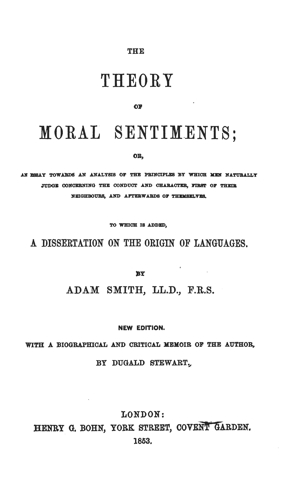
The Theory of Moral Sentiments and on the Origins of Languages (Stewart ed.)
- Adam Smith (author)
- Dugald Stewart (editor)
Key Quotes
Odds & Ends
Even of the passions derived from the imagination, those which take their origin from a peculiar turn or habit it has acquired, though they may be acknowledged to be perfectly natural, are, however, but little sympathized with. The imaginations of mankind, not having acquired that particular turn,…
Justice
Beneficence is always free, it cannot be extorted by force, the mere want of it exposes to no punishment; because the mere want of beneficence tends to do no real positive evil. It may disappoint of the good which might reasonably have been expected, and upon that account it may justly excite…
Justice
There is, however, another virtue, of which the observance is not left to the freedom of our own wills, which may be extorted by force, and of which the violation exposes to resentment, and consequently to punishment. This virtue is justice: the violation of justice is injury: it does real and…
Society
The love of our country seems, in ordinary cases, to involve in it two different principles; first, a certain respect and reverence for that constitution or form of government which is actually established; and secondly, an earnest desire to render the condition of our fellow-citizens as safe,…
Philosophy
These natural hopes, and fears, and suspicions, were propagated by sympathy, and confirmed by education; and the gods were universally represented and believed to be the rewarders of humanity and mercy, and the avengers of perfidy and injustice. And thus religion, even in its rudest form, gave a…
Quote
The man whose public spirit is prompted altogether by humanity and benevolence, will respect the established powers and privileges even of individuals, and still more those of the great orders and societies, into which the state is divided. Though he should consider some of them as in some measure…
Economics
Man naturally desires, not only to be loved, but to be lovely; or to be that thing which is the natural and proper object of love. He naturally dreads, not only to be hated, but to be hateful; or to be that thing which is the natural and proper object of hatred. He desires, not only praise, but…